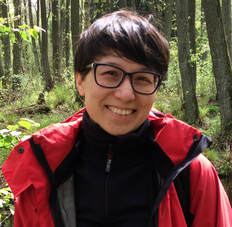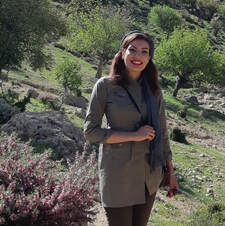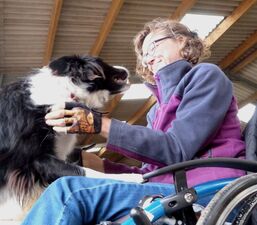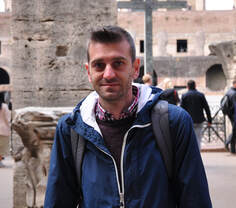Principal Investigators
|
Małgorzata Pilot, Principal Investigator - Canid projects
✉ [email protected] My research is focused on the application of genetic/genomic methods to address questions in evolutionary biology and behavioural ecology, using mammals as model organisms. The main research themes I have been developing throughout my career include evolutionary genetics/genomics of wild canids and free-ranging dogs, demographic, behavioural and evolutionary responses of large carnivores to climate and environmental change, and the effect of genetic relatedness on inter-individual interactions within and between social groups. Currently, I am leading a research project focused on the causes and consequences of hybridisation between representatives of the genus Canis. For my publication list, see Google Scholar profile or ResearchGate profile |
|
Andre E. Moura, Principal Investigator - Catacean projects
✉ [email protected] My research is focused on wildlife ecology and evolution using a combination of methodological approaches. My taxonomic expertise is in Cetaceans (whales and dolphins) and most of my past publications have been based on genetic/genomic methods. However, I have also participate in animal distribution studies and ecological niche modelling, and increasingly on morphological shape analyses. I am particularly interested in the interaction between genetics, anatomy/physiology and ecology, and how it determines species habitat choice and evolutionary survival. My main approach is to correlate genetic/morphological variation with ecological factors, with particular emphasis on functional genes and signals of natural selection. My main research project currently focuses on characterizing the genetic composition of immune system genes in striped dolphins, as they experienced repeated epizootics of Morbillivirus over a 30 year period. I have been developing this project for several years now, resulting in 3 postgraduate thesis, a current NCN funded project on immunogenomics, and several ongoing international collaborations. I'm also interested in wildlife conservation, and continue to work on conservation related research projects whenever possible. |
Postdoctoral Researchers
|
Karolina Doan, Postdoctoral researcher
✉ [email protected] My research interest focus on evolutionary genetics, phylogeography, population genomics and paleogenetics of mammals. In my previous projects I was using ancient DNA as a tool for understanding red deer’s population dynamics in response to climate and environmental changes as well as human activities. Other projects I was involved in concerned the ancestry, kinship structure and well-being of historical human populations. I gained my research experience at the Institute of Genetics and Biotechnology, University of Warsaw, where I obtained my PhD in 2017. Since 2016 I have been working at the Museum and Institute of Zoology PAS and in January 2020 I joined the Evolutionary Genomics Group. For my publication list see my profiles on Google Scholar or ResearchGate |
|
Marketa Harazim, Postdoctoral researcher
My research focuses on genomic and genetic adaptation to infectious diseases. Formally educated in molecular biology and immunology, I now focus my interest on the evolutionary aspects of disease susceptibility. During my previous studies, I focused on the evolution of cytokine families and coevolution with their receptors in vertebrates. Currently I am interested in the association of genomic variation with physiological function. I am a postdoctoral researcher studying susceptibility of Cetaceans to CeMV infection using genomic methods. I base my current project on experience gained during my Ph.D. studies, where I research the bat adaptation to infection by viruses and fungal emerging pathogens. Apart from research in functional genomics, I have experience in transcriptomic research, which I gained during my stay at the Institut Pasteur in Paris, studying the reaction of bat cell cultures to experimental infection by lyssaviruses. |
Postgraduate Students
|
Francelly Martínez-Sosa, PhD student
I am originally from Puerto Rico where I attained my bachelor’s degree in Integrative Biology at the University of Puerto Rico, USA. My undergraduate project was focused in husbandry and ethology of Rhesus macaques. I attained my MSc in Life Sciences at the University of Lincoln, U.K. My thesis project was focused on the conservation genetics of Barbary macaques (Macaca sylvanus). In addition to these projects I have worked on projects focused on invertebrate neuro-ecology, human population genomics, marine mammal husbandry, invertebrate and reptile ecology. My Ph.D. project is focused on the effect of environmental factors on adaptive and neutral genetic variation in grey wolves. |
|
Morgane Dromby, PhD student
My research interests concentrate on the study of marine mammals (cetaceans) ecophysiology, trophic ecology, and evolutionary ecology. Throughout my Master´s degree, I have been working on a new way to assess nutritional conditions and health status of cetaceans species, via the analysis of nucleic acid-derived indices (RNA/DNA ratios). Complementary, I have been studying marine mammals feeding ecology and investigated community structure through space and time, using Stable Isotope Analysis. I graduated from my Master´s degree in Marine Biology in December 2018, at the University of the Algarve (Portugal). I have initially been trained on population dynamic and evolution during my undergraduate studies at the University of Burgundy (France) and the University of Sheffield (England). My current research project centres on determining the potential adaptive nature of skull shape diversification in bottlenose dolphin’s species living in disparate habitats. This will be realized though both morphological and genomic analysis of morphology related genes, which will be achieved in the course of my Ph.D degree at the MIIZ. |
|
Roya Adavoudi, PhD student
I earned my MSc degree in the field of biodiversity conservation and management from Tehran University, Iran in 2018. My research interests focus on population genetics, evolution and landscape genetics/genomics of wildlife species. During my Masters degree, I used molecular markers to investigate genetic variability and population structure of the Caucasian pit viper (Gloydius caucasicus) in Iran. In addition, I adopted an individual-based landscape genetics approach to quantify the rate of gene flow between populations and assess the effects of landscape factors on the spatial patterns of genetic variation of this species. My PhD project is focused on assessing the role of hybridization in facilitating the evolutionary response to natural and anthropogenic environmental changes by identifying the mechanisms of interaction between introgression and natural selection in genus Canis. |
Former Members
|
Helen Brierton, MSc student (Completed)
I was awarded a bachelor’s degree in Zoology from the University of Bristol many years ago, and went on to pursue a career in the media researching natural history subjects. My love of the natural world, specifically marine biology and Cetacea steered me to return to academia. I am studying for my Masters degree by research at the University of Lincoln, UK, my research project entitled “Cranial morphology of Delphinidae”. I am looking into how different environmental, ecological and behavioural factors may affect skull shape in all species across the Family. |
|
Lesley Sitter, Postdoctoral researcher
My work at the Museum and Institute of Zoology PAS revolves around developing a computational toolkit that can be easily run on novel Exome data, to streamline and speed up data processing and initial analysis of data. My background is in molecular biology and bioinformatics, where my main interests lie in answering evolutionary questions through comparative genomics. I have previously worked on developing a QTL detection and visualization pipeline for melon data, and have performed GWAS in tomato plant. My PhD focused on finding a correlation between horizontal gene transfer and the virulence of several Serratia bacteria strains towards pest beetle species, using next-generation sequencing data and wet lab cloning. I received my PhD degree in computational biology through the Bio-protection Research Centre of New Zealand in 2020. For more details please check my LinkedIn profile, or check out my website Here. |
|
Sylwia Czarnomska, Postdoctoral researcher
I am population geneticist interested in applying computational tools and high-throughput technologies to understand genomic basis of local adaptation. In my previous projects I applied landscape genetics/genomics approach to quantify influence of environmental heterogeneity on patterns of genetic variation among individuals and populations, and to identify loci that mediate adaptation to specific environmental drivers in species of very different demography and ecology (wolves, yellow necked mice, great tit). I am also interested in studying mitochondrial and nuclear genome interactions and investigating the importance of mitochondria in thermal adaptation process. Before starting a current position, I completed two post-doctoral fellowships: at Wild Urban Evolution and Ecology Lab (University of Warsaw) and at Laboratory of RNA Biology and Functional Genomics (Institute of Biochemistry and Biophysic PAS). I received PhD degree in biology from University of Warsaw in 2016 after conducting my PhD project at Mammal Research Institute PAS in Białowieża. |
|
Milomir Stefanović, Postdoctoral researcher
My research interests focus on the application of high-throughput sequencing technologies in the understanding of evolutionary mechanisms, maintaining the genetic variability in wildlife animal populations. I obtained my PhD in Genetics in 2020 at the University of Novi Sad, Serbia, studying the genetic signature of local adaptations in brown hares from heterogeneous landscapes. Since 2014, I was working as a Research and Teaching Assistant at the Faculty of Sciences, University of Novi Sad, Serbia. I joined the Evolutionary Genomics Group in May 2021, where I am involved in the project dealing with genomic signatures of hybridization within the genus Canis, and its role in evolutionary responses to environmental change. For more details, see my Research Gate or LinkedIn profile. |
|
Alejandro Flores-Manzanero, Postdoctoral researcher My research interests focus on evolutionary biology, population genetics and landscape genetics/genomics of wildlife populations, specially of mammals. I developed my research experience at Ecology Institute, National Autonomous University of Mexico (UNAM), where I obtained my PhD degree in December 2019. During my MSc thesis, I evaluated the population genetic diversity and structure of two endemic carnivores from a Caribbean Island. For my PhD project, I implemented a landscape genetics approach to assess the effects of the environment and landscape factors on the genetic patterns of rodent species in an arid environment. I gained experience in programming language and spatial statistics during a stay at Virginia Commonwealth University. I also have experience in projects related to the knowledge and uses that people have regarding wildlife mammals (ethnozoology). I joined the Evolutionary Genomics Group in August 2021. |












